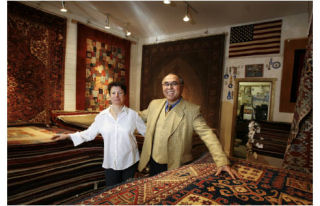When Birgul Solak became a U.S. citizen in August, she and her husband, Adem, celebrated by proudly hanging a handmade rug of the Star-Spangled Banner in front of their business on Winslow Way.
And they celebrated again three months later when Adem joined her as an official American citizen.
The stories of people who have migrated to the United States over the years undoubtedly are as varied as the circumstances that caused them to leave their homelands behind for this “land of opportunity.”
Bainbridge Island has its share of them, including the Solaks, who left their native Turkey in 1997 for Seattle, and eventually the island. Their story doesn’t ring of high intrigue or dramatic struggles, though the last 10 years have certainly been adventurous for the couple.
In a way, the Solaks are typical new citizens because they fit the stereotype that allows entry and a green card.
They have family here (her brother, a rug merchant in Seattle) and he has a trade that allows them to fit in as law-abiding, tax-paying members of the American dream. They also happen to be very nice people who are doing their best to be good citizens in their adopted country.
After 10 years and now armed with citizenships, they are finally beginning to feel at home here. The language and customs have made it difficult at times, but they feel a friendliness here that is welcoming for them.
“I like people here because of trust,” Adem says in his halting English, which has improved greatly while being tutored (for the citizenship tests) during the last two years by Barbara Kerr, a volunteer for the Kitsap Literacy Council. “Trust very important for my business.”
The Shirvan Rug Gallery has slowly grown over the last nine years as islanders and people from all over the region have discovered that Adem is a master in restoring, repairing and cleaning handmade rugs from the Middle East and Asia. And, perhaps most importantly, the shop has a retail inventory of about 1,000 rugs, all of which are handmade and lovingly cared for by the Solaks.
He grew up in Sultanhani, a small town in central Turkey that is famous for its handmade rugs. “Sultanhani has 150 stores sell rugs,” he said.
He and three brothers grew up in the business, though he needed to leave school behind at an early age to work in restaurants and then in his father’s rug shop. He grew to be mayor of the town of 12,000 people, but eventually moved to Istanbul, where he owned two wholesale stores and one retail shop.
Life was good, he said, until repercussions of the Gulf War struck the region in the early 1990s.
“No tourists, no business,” he said. “Europeans no longer come. Economy no good.”
So they decided to visit Birgul’s brother in Seattle to see if they might like a change of scenery. They liked it, and moved a couple of years later to Seattle, where Adem began working with his brother-in-law. After a couple more years, they discovered an empty space in a Winslow Way building, expanded the business there and bought it in 2002.
Gradually they built up the business customer by customer. Their word is their bond, and most of their customers rave about their work.
For example, when Mary Williams decided her handmade 13-by-18-foot rug – nearly destroyed by her dog – needed to be repaired, re-dyed and cleaned, she was told Shirvan was the place to go.
“They are really neat people and have a sincere interest in doing the best job possible,”she said. “They are very accommodating. Professional, in a word.”
When the satisfied customer learned that the Wing Point Country Club sought help on their rugs, she suggested they go to the Solaks.
“We try to educate customers about rugs,” said Birgul. “Many people here don’t know about them. They know handmade is best, but also important that it is made of handspun wool, not machine. With machine, it sheds. Not when handmade.”
To make a point about fine rugs keeping their value if they are properly cared for, Adem brought out a 2-by-3-foot rug made of Turkish silk. It was beautiful and worth about $4,500. He said that it was hand woven to have 144 knots per square centimeter.
“Take care, last forever,” he said.
With their business in order, the Solaks decided that since they were eligible for citizenship they would start the tedious application process.
Kerr began tutoring Adem, while Glena Tetti tutored Birgul, who was more familiar with English than her husband. Among themselves, the couple usually spoke just their native language, so it was important for them to spend long hours with a tutor.
Kerr estimates that she spent an hour a week with Adem over a two-year period, meaning more than 100 hours of tutoring.
“It was really quite fun,” said Kerr, who taught English for many years. “He has come a long ways. It was hardest for him, especially the sentences you have to learn. It took him a little longer than Birgul. But he stuck with it, and he’s so grateful now. We’ve become good friends, Birgul, too. They are wonderful people.”
Adem was among about 150 people who attended the citizenship swearing-in process in a federal building in Tukwilla. He received his certificate two days after the Nov. 4 general election, which Birgul got to participate in because she became a citizen in August.
“Each person was called by their name and then they walked up and received the certificate,” Kerr said. “It was wonderful. We took pictures of him. He was so proud.:
For good reason, Adem said. “Now, American.”
“We like it here,” said Birgul. “We celebrate Fourth of July. Thanksgiving. We are Americans.”
They even hang some Christmas lights, Kerr said, despite the fact they are Muslims.
Also Americans.


